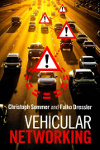Cooperative Mobile Systems 2019s [CMS 2019s]
L.079.05811, Summer 2019
Contents
Vehicle-to-everything communication can serve as the basis for novel applications enabling cooperation among mobile systems of the future. Trucks, cars, bikes, pedestrians, and cities are all part of such a system. This course will cover the basis and the application of communication concepts to the design of such cooperative mobile systems. A practical part covers the application of learned theroetical concepts to the design of novel cooperative mobile systems, as well as the study of such systems via simulative performance evaluation.
Learning Outcome
Students will be able to understand how vehicle-to-everything communication can serve as the basis for applications enabling cooperation among trucks, cars, bikes, pedestrians, and cities. They will also be able to apply this knowledge to the design of future cooperative mobile systems - both in theory and in practice.
General Information / Methods
This master course will be held in English and all the course material is available in English. Oral exams can be organized in English as well as in German.
- (Lecture: 2 SWS, Labs: 3 SWS)
Prerequisites
- No formal prerequisites for joining. Still, certain background knowledge is not taught in this course, but assumed to be present (for all of lecture, labs, and exams).
- Background (or willingness to learn) computer networking with a focus on wireless. Background (or willingness to learn) simple math with a focus on statistics.
- For the labs, simulations will be designed, written (in C++), and run (on Linux systems). For this, programming and computer skills are essential.
- University has also prepared a brief self-assessment test.
Instructors
- Lecture: Christoph Sommer
- Labs: Tobias Hardes
Schedule
This course consists of lectures and labs. The lecture covers theoretical parts of the course, the labs cover practical parts.
-
Lecture:
- Mondays, 14-16h, F1.110
- No lecture on 1 April 2019 (orientation week for new students)
- Mondays, 14-16h, F1.110
-
Labs:
- Group 1: Wednesdays, 8-11h, F1.520
- Group 2: Wednesdays, 13-16h, F1.520
Exams
Oral examination (by appointment). Successful completion of labs required ("Studienleistung").
Lecture
- Course Organization (pdf, v2)
- Introduction (pdf, v1)
- Simulation (pdf, v2)
- Channels (pdf, v2)
- Information Dissemination (pdf, v1)
- Cooperative Awareness (pdf, v2)
- Channels: VLC (Guest Lecture) (pdf, v1)
- Platooning (pdf, v1)
- Intersections (pdf, v1)
Labs
We provide a virtual machine, which we call Instant-CMS. The machine is available as a virtual machine disk or as an ova-file on the IRB file server. You can download this VM and use it for all lab sessions or start it directly from from the IRB computers. For further details and for instructions to install the tools on your own computer, please refer to the installation manual. Make sure you have a working machine ready for the first lab!
- Lab introduction (simulation-lab.pdf, 09.04.2019)
- Installation (installation.pdf, 05.04.2019)
- R Talk (Result Evaluation with R & How to do plotting?, 17.05.2019)
- Sheet 1 (OMNeT++, TicToc, 17.04.2019)
- Sheet 2 (Consumer-producer-dispatcher & Detour project, cms_detour.tar.gz eval.R, 24.04.2019)
- Sheet 3 (Evaluation with R & Flooding project, SimpleFlooding.tar.gz, 23.05.2019)
- Sheet 4 (Platooning project, lab4.tar.gz, 12.06.2019)
Evaluation
Many thanks for the critical and helpful evaluation!
-
Additional Questions
- VLC: please rate the relative usefulness of the guest lecture on VLC (-1 to +1)
- Platooning: ditto for the guest lecture on platooning (-1 to +1)
- Preparation: How many weeks from today did you start preparing for the exam? (-11 to 0)
- Contact: How did you contact the lecturer outside the lecture? (Panda, mail, office, ...)
-
Additional Questions
- Best Lab: Which lab task did you like best? (1,2,3,4)
- Manpower: Was one person supporting the lab sufficient? (yes/no)
- Deadlines: Are more deadlines helpful to distribute the workload? (yes/no)
Literature
-

 Christoph Sommer and Falko Dressler, Vehicular Networking, Cambridge University Press, 2014.
[DOI, BibTeX, Details...]
Christoph Sommer and Falko Dressler, Vehicular Networking, Cambridge University Press, 2014.
[DOI, BibTeX, Details...]
-
Averill M. Law, Simulation, Modeling and Analysis, ed. 4, Singapore, Singapore, McGraw-Hill, 2007.
-
Ronald E. Walpole, Raymond H. Myers, Sharon L. Myers and Keying Ye, Probability and Statistics for Engineers and Scientists, ed. 9 (international), Pearson, 2012.